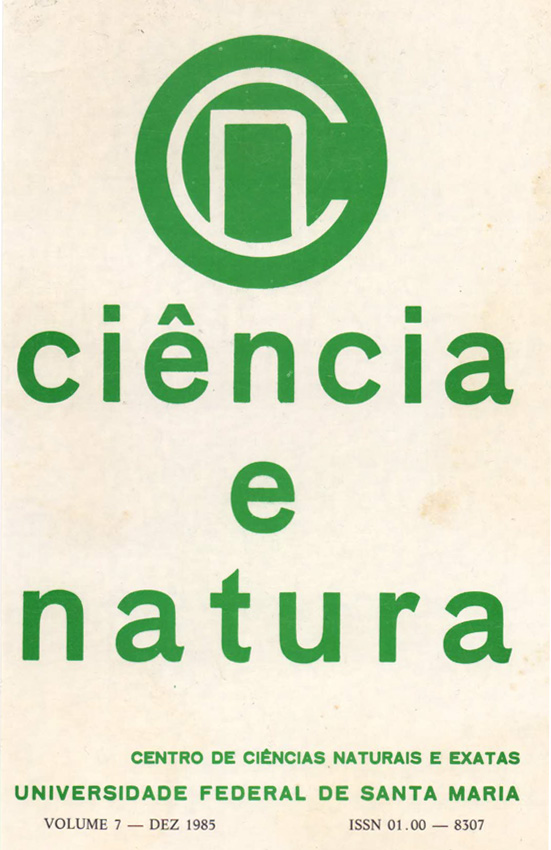Calibration of neutron sources by the activation of a manganese sulphate bath method
DOI:
https://doi.org/10.5902/2179460X25402Abstract
Several Am-Be sources were calibrated using the manganese sulphate bath method. The sources were encapsulated in cilindrical recipients, and submerged in the center of spherical tanks with a concentra te solution of manganese sulphate in water. The measurements were made in a circulating bath using a 50 cm diameter tank and in a static bath using a 100 cm diameter tank. The neutron emmission rates were computed ~sing the measured gamma emmision rates, bath efficiency and the fraction of the total number of thermal neutrons absorbed by the manganese. Effects due to fast reactions with oxigen and sulfur, self-absorption and neutron leakage were also considered. The results obtained by the method are in good agreement with the values furnished by the manufacturer.
Downloads
References
SCHUCH, L.A., Calibração de Monitores de Neutrons com Moderadores e Aplicação na Determinação de Fatores de Calibração de Dosimetros de Albedo, Tese de Mestrado, IME, Rio de Janeiro, (1979).
LOUWRIER, P.W.F., Calibration of a Radium (alpha, n) Beryllium Neutron Source, Institute for Nuclear Physics Research (I.K.O.), Amsterdam (1966).
AXTON, E.J., CROSS, P., ROBERTSON, J.C., Calibration of the NPL Standard Ra-Be Photoneutron Source by an Improved Manganese Sulphate Bath Technique, J. of Nucl. Energy, l1, (1965).
GURFINKEL, V., AMIEL, S., Absolute Calibration of Neutron Source By Manganese Sulphate Bath Method, Israel Atomic Energy Commission (1963).
ALVES, R.Ñ., REIS, D.C.O., FERNANDES, S.N., The Use of a Small MnS04 - Bath for Calibration of Neutron Source, Proc. Sec. Symp. on Neut. Dosim. in Biol. and Med., II (1974).
YARITSINA, I.A., A Critical Comparison of Three Methods of Absolute Yield Measurements for Neutron Source, Radiation Measurement in Nuclear Power (1966).
AXTON, E.J., CROSS, P., Reactor Sci. Technol., J. Nucl. Energy, 15, 22, (1961).
NAGGIAR, V., Rapport BIPM (1967).
BURGER, G., GRUNAUER, F., Publicação Interna do GSF, Munich.
HUGHER, D.J., MAGURNO, B.A., BRUSSEL, M.K., BNL 325,.1, (1960).
Handbook of Chemistry and Physics, Chemical Rubber Publishing Co., Cheveland, Ohio, USA (1951).
Downloads
Published
How to Cite
Issue
Section
License
To access the DECLARATION AND TRANSFER OF COPYRIGHT AUTHOR’S DECLARATION AND COPYRIGHT LICENSE click here.
Ethical Guidelines for Journal Publication
The Ciência e Natura journal is committed to ensuring ethics in publication and quality of articles.
Conformance to standards of ethical behavior is therefore expected of all parties involved: Authors, Editors, Reviewers, and the Publisher.
In particular,
Authors: Authors should present an objective discussion of the significance of research work as well as sufficient detail and references to permit others to replicate the experiments. Fraudulent or knowingly inaccurate statements constitute unethical behavior and are unacceptable. Review Articles should also be objective, comprehensive, and accurate accounts of the state of the art. The Authors should ensure that their work is entirely original works, and if the work and/or words of others have been used, this has been appropriately acknowledged. Plagiarism in all its forms constitutes unethical publishing behavior and is unacceptable. Submitting the same manuscript to more than one journal concurrently constitutes unethical publishing behavior and is unacceptable. Authors should not submit articles describing essentially the same research to more than one journal. The corresponding Author should ensure that there is a full consensus of all Co-authors in approving the final version of the paper and its submission for publication.
Editors: Editors should evaluate manuscripts exclusively on the basis of their academic merit. An Editor must not use unpublished information in the editor's own research without the express written consent of the Author. Editors should take reasonable responsive measures when ethical complaints have been presented concerning a submitted manuscript or published paper.
Reviewers: Any manuscripts received for review must be treated as confidential documents. Privileged information or ideas obtained through peer review must be kept confidential and not used for personal advantage. Reviewers should be conducted objectively, and observations should be formulated clearly with supporting arguments, so that Authors can use them for improving the paper. Any selected Reviewer who feels unqualified to review the research reported in a manuscript or knows that its prompt review will be impossible should notify the Editor and excuse himself from the review process. Reviewers should not consider manuscripts in which they have conflicts of interest resulting from competitive, collaborative, or other relationships or connections with any of the authors, companies, or institutions connected to the papers.






